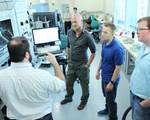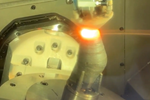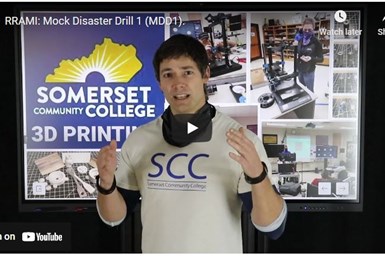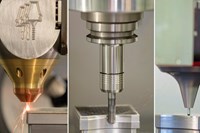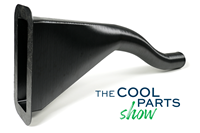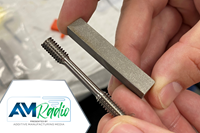Rapid Response AM Initiative Holding Mock Disaster Drill Feb. 1
Group testing rapid 3D printing response to manufacture substantial amounts of critical supplies in the event of emergencies.
The Rapid Response Additive Manufacturing Initiative (RRAMI) – Mock Disaster Drill 1 will be held on Monday, Feb. 1 in Kentucky. The RRAMI project was developed by Eric Wooldridge and Heather Beebe of Somerset Community College (SCC) in Kentucky to enable a statewide, variable location, rapid 3D printing response in the event of emergencies (such as COVID-19, natural disasters or other calamities) to manufacture substantial amounts of critical supplies.
The RRAMI Mock Disaster Drill will be a first of its kind test event to determine how quickly and effectively a well-coordinated system of remote 3D printing production sites, with minimal operators, separated by hundreds of miles can simultaneously fabricate products that would be necessary in an emergency event.
Products that would no longer be available due to a breakdown of the conventional manufacturing supply chain will be produced, such as personal protection equipment (PPE), hardware components or vital tools. The RRAMI system will initially be composed of four to six college sites across Kentucky that have significant quantities of similar low-cost additive manufacturing (AM) equipment, trained experts and located in regions of potential need. The first test product during MDD1 will be 3D printed headbands that can be quickly assembled with Plexiglas and elastic to form a face shield.
Through federal funding, the RRAMI project was green lit in the summer of 2020, sites were set up, staff was trained and the system is now preparing for its first Mock Disaster Drill (MDD1) to occur at 9 a.m. EST on Feb. 1st 2021. The Mock Disaster Drill will last 72 hours. SCC will provide real-time data feeds of the MDD1 progress and results.
The RRAMI network includes five Kentucky Community and Technical College System (KCTCS) sites, Somerset Community College (SCC), Jefferson Community and Technical College (JCTC), Owensboro Community and Technical College (OCTC), Madisonville Community College (MCC) and Southcentral Kentucky Community and Technical College (SKYCTC).
Related Content
-
ActivArmor Casts and Splints Are Shifting to Point-of-Care 3D Printing
ActivArmor offers individualized, 3D printed casts and splints for various diagnoses. The company is in the process of shifting to point-of-care printing and aims to promote positive healing outcomes and improved hygienics with customized support devices.
-
FDA-Approved Spine Implant Made with PEEK: The Cool Parts Show #63
Curiteva now manufactures these cervical spine implants using an unusual 3D printing method: fused strand deposition. Learn how the process works and why it’s a good pairing with PEEK in this episode of The Cool Parts Show.
-
3D Printing Startup to Deliver Thousands of Custom Hearing Aids Over Next Five Years
Starting with a pilot program in Jordan, nonprofit 3DP4ME is developing workflows to 3D print hearing aid earmolds and prosthetics near the people who need them.

